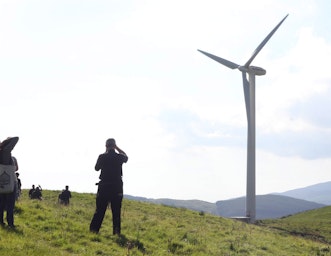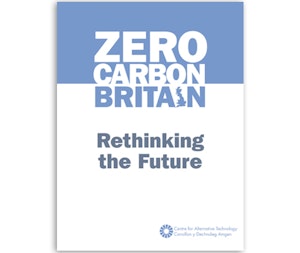
Through researching and communicating a detailed model of a Zero Carbon Britain, CAT aims to stimulate debate around rapid decarbonisation, engage the research community and get society thinking in new ways to help build consensus around rapid action.
What is Zero Carbon Britain?
Zero Carbon Britain is a research project from the Centre for Alternative Technology (CAT).
For over 10 years now we have been looking at ways of getting to net zero greenhouse gas emissions using technology available today, in response to the urgent need to find solutions to the climate crisis.
Our most recent technical scenario, Zero Carbon Britain: Rethinking the Future, was published in 2013 and is currently being updated to take account of developments in knowledge and technology.
Our intention is to open conversations that are rooted in the physical realities of what the global scientific consensus demands, whilst also acknowledging the UK’s historical responsibility as a long-industrialised emitter. What our model offers is an end-point, where all our emissions add up to net zero.
Can we reach zero carbon?
Our modelling to date shows that – whilst challenging – it is possible to reach net zero greenhouse gas emissions using technology available today.
We have produced a technical scenario that shows how it could be achieved through a combination of powering down energy demand from buildings and transport, powering up renewable energy supplies, and changing diets and ways of using land.
The solutions are complex and interlinking, but some of the key elements are:
- High Passivhaus standards for all new builds, retrofitting all existing buildings, and improving internal temperature control could reduce heating demand by around 50%.
- Reducing how much we travel and changing how we travel could reduce energy demand for transport by 78%.
- It is possible to meet 100% of the reduced energy demand with renewable and carbon neutral energy sources, without fossil fuels and without new nuclear.
- Many different renewable energy sources are in the mix, with wind (both on-shore and off-shore) providing around half of the energy supply.
- Most of the energy in our scenario (around 60%) is produced in the form of electricity.
- We can balance supply and demand – hourly modelling of the renewables mix in our scenario over a ten-year period shows that we would produce a surplus of energy 82% of the time. Smart appliances and energy storage solutions (batteries, pumped storage, heat storage, hydrogen, carbon neutral synthetic natural gas) could be used to cover the remaining periods.
- Diets and land-use are an essential part of the mix. Dietary changes, mainly reducing meat and dairy, combined with food waste reduction and improved agricultural processes could cut greenhouse gas emissions from agriculture by 75%.
- This could also improve our health and free up land for other purposes, including a doubling of forest cover, restoring peatlands and providing more ‘wild spaces’ for biodiversity to thrive.
This represents a massive transformation in society, but we believe that – with enough political, social and cultural will – it is possible. As the IPCC 1.5C special report shows, the alternative is simply unthinkable.
How quickly can this be done?
We have created a scenario showing that a Zero Carbon Britain is technically possible using technology available today. How quickly we get there depends on the level of political and social commitment.
There are key dates that should be considered in this conversation:
1. The date the science demands we reach zero
The UK must play our part in offering a good chance of humanity avoiding very serious climate impacts. The recent IPCC report shows that to stay within 1.5C of warming we need to achieve net zero greenhouse gas emissions globally by 2050, with a 45% decrease by 2030.
Let’s be clear – at 1.5C of warming there are serious impacts; it’s just a lot less frightening than the 2C-plus scenarios.
Every decimal of a degree makes a difference so the faster we get to zero the better.
2. The date demanded by climate justice
The UK also needs to build climate justice into its plans; we have been burning fossil fuels for 150 years, and many majority world countries still urgently need to build the basic human infrastructure.
So ideally the UK should consider reaching zero as quickly as possible.
3. The date by which we can physically install the required infrastructure
This includes the time needed to retrofit houses, re-shape transport systems, change land-use and install the renewable capacity described.
When we launched our original scenario in 2007, we estimated around 20 years to deliver, focusing on paths that minimised disruption. But now, 12 years on, with our government still working to an outdated ‘80% by 2050’ target, and with far too little national-scale systemic planning in the intervening years, time is getting very tight.
Is there support for the kinds of radical changes that would be needed?
We believe that, with the social support shown by school strikes, the civil society actions and the climate emergency declarations from town, city and regional councils, cultural groups and now universities, it could be possible to get to zero much faster than would be possible without this groundswell of support.
What government measures would help us reach zero?
We need strong government policy and financial support to achieve the transition. Here are a few of the measures we’d like to see:
- Phase out fossil fuels fast. Follow the lead of Wales, Scotland and Northern Ireland and stop fracking now. Stop burning coal.
- Support a nationwide programme to insulate the UK’s housing stock, allowing us to power down our energy demand.
- Invest in renewable energy, including on-shore and off-shore wind, powering up our clean energy supply.
- Transform agricultural subsidies to support a food system that is good for the environment and for our health.
- Radically increase UK tree cover and enhance other natural climate solutions like soils and peatlands.
- Invest in joined-up affordable public transport, and in better infrastructure for walking and cycling.
- Cut flights through a frequent flyer levy – and scrap the third runway at Heathrow.
- Pay our historic debts – the UK and other long-industrialised nations grew wealthy on the back of burning fossil fuels; climate justice demands that we take ambitious action now, and provide both financial and technical support for less developed countries to help with mitigation and adaptation measures.
Government action is key to cracking climate change – what can the rest of us do?
- Campaign for change – use your voice to encourage politicians and businesses to take urgent action.
- Change how you travel – fly less, drive less, cycle more, take the train.
- Switch to a green electricity provider to support investment in renewable energy.
- Wherever possible, insulate our homes to reduce wasted energy.
- Eat less meat and dairy – our dietary choices can have a big impact.
- Buy less stuff.
- Check out each political party’s climate change policies before deciding how to vote – and challenge your local candidates.
- Join a community energy scheme – or start one up.
- Talk about climate change with friends, family and colleagues.
So can we do it by 2025?
The short answer is that early action is vital, and we won’t know until we try.
Want to find out more about our Zero Carbon Britain research?
Zero Carbon Britain: Rethinking the Future:
We have two events coming up that look at the scenario in more detail and explore the solutions that could help us reach zero:
We hope our research will support those actively working to catalyse urgent action across all sectors of society – if we can’t picture ourselves in the solution, we will surely stay stuck in the problem.
- Zero Carbon Britain
- Press Releases
- Climate Change
- Energy
Related Topics
Related Pages
Related events


Beekeeping Intensive
6th September 2025
Sustainable Woodland Management
10th November 2025

